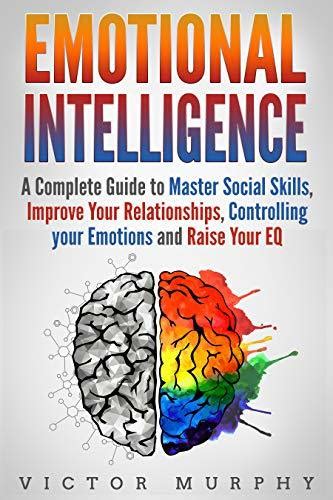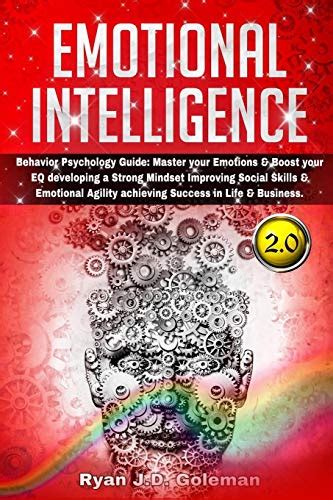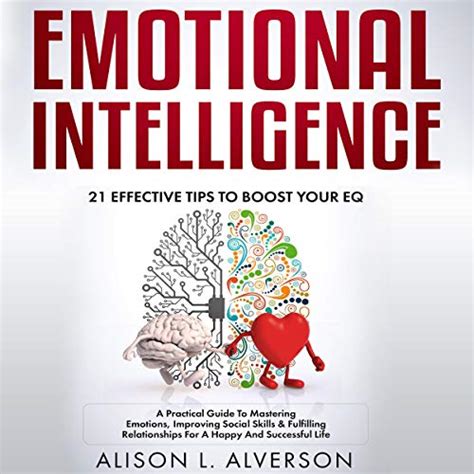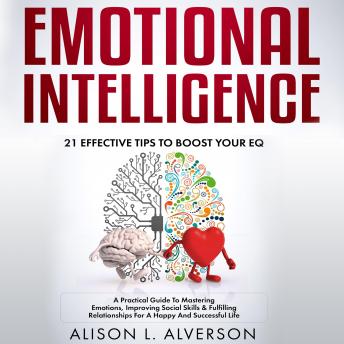Emotional Intelligence (EQ) isn’t just a buzzword; it’s a powerful tool that can significantly enhance your overall health and wellbeing. By understanding and managing your emotions, you can positively impact both your physical and mental health, fostering stronger relationships and leading a more balanced life. This article explores the connection between EQ and health, highlighting how boosting your emotional intelligence can lead to a healthier, more fulfilling life. We’ll delve into practical strategies to enhance your EQ and share real-life success stories, guiding you on how to integrate emotional intelligence into your daily routine for lasting benefits.
tirfblog.com will provide a detailed exploration of this topic.
1. Understanding Emotional Intelligence (EQ)
Emotional Intelligence (EQ) is the capacity to identify, comprehend, and regulate our own emotions, as well as to perceive and understand the emotions of those around us. Unlike traditional intelligence, which is quantified by IQ, EQ centers on our ability to navigate interpersonal dynamics, make sound judgments, and handle social intricacies. It involves being sensitive to the emotional undercurrents that shape our thoughts and actions, leveraging this awareness to communicate effectively and foster empathy with others.
Emotional intelligence (EQ) is comprised of several crucial components: self-awareness, self-regulation, motivation, empathy, and social skills. Self-awareness entails understanding your own emotions and how they influence your actions. Self-regulation refers to the ability to manage your emotions in constructive ways, such as controlling impulsive reactions and behaviors. Motivation implies being driven to pursue goals for personal satisfaction rather than external incentives. Empathy is the capacity to comprehend and share the emotions of others. Finally, social skills encompass managing relationships to guide people towards desired outcomes.
Emotional intelligence (EQ) is crucial for a fulfilling life, impacting everything from your relationships to your career. By understanding and developing your EQ, you gain the ability to navigate the emotional complexities of everyday life. This empowers you to respond effectively to challenges, ultimately leading to a more balanced and enriching existence.

2. Connection Between EQ and Physical Health
The link between Emotional Intelligence (EQ) and physical health is strong and often overlooked. High EQ fosters better stress management, directly benefiting physical well-being. Effective emotional regulation decreases the risk of stress-related conditions like heart disease, hypertension, and a weakened immune system. Chronic stress, frequently stemming from poor emotional management, can contribute to a range of physical ailments, including headaches, digestive problems, and even persistent pain.
Moreover, individuals with high EQ are more likely to engage in healthier behaviors, such as regular exercise, balanced eating, and adequate sleep. They understand the importance of self-care and are better equipped to maintain a lifestyle that supports physical wellbeing. Additionally, the ability to manage emotions positively influences how we handle physical pain and recovery, as those with high EQ are often more resilient in the face of illness or injury. Overall, a well-developed EQ contributes to a healthier, more vibrant physical life.

3. EQ and Mental Health Benefits
Emotional Intelligence (EQ) plays a crucial role in mental health, providing a foundation for resilience and emotional stability. Individuals with high EQ are better equipped to handle life’s challenges and stressors, which can significantly reduce the risk of developing mental health issues such as anxiety and depression. By being self-aware and understanding their emotional responses, they can identify negative thought patterns early and take proactive steps to address them.
EQ also enhances emotional regulation, allowing individuals to manage their emotions in a healthy way. This reduces the intensity and duration of negative emotions like anger, frustration, and sadness, preventing them from escalating into more severe mental health conditions. Additionally, high EQ fosters positive relationships, which are vital for mental wellbeing. Strong social connections provide emotional support, reduce feelings of loneliness, and create a sense of belonging.
Furthermore, empathy, a key component of EQ, enables individuals to understand and support others, creating a positive feedback loop that enhances their mental health. By improving emotional intelligence, you can build a mental resilience that not only helps you navigate daily stress but also protects your long-term mental health, leading to a more balanced and fulfilling life.

4. EQ’s Influence on Relationships
Emotional Intelligence (EQ) plays a crucial role in shaping our relationships, influencing how we connect with others and handle interpersonal situations. Individuals with high EQ excel at communication, effectively expressing their thoughts and feelings while remaining sensitive to the emotions of those around them. This heightened understanding cultivates empathy, leading to deeper connections and more meaningful interactions.
Emotional intelligence (EQ) is a crucial asset in navigating both personal and professional relationships, particularly in conflict resolution. Individuals with high EQ possess the ability to approach disagreements with composure and objectivity, striving for solutions that are mutually beneficial. Their enhanced emotional awareness allows them to recognize the underlying feelings driving a conflict, fostering a more constructive and empathetic approach to problem-solving.
Furthermore, EQ plays a crucial role in establishing trust and closeness in relationships. Individuals who possess self-awareness and emotional transparency create an atmosphere of openness and mutual respect. This, consequently, strengthens the bonds between people and fosters feelings of security and belonging.
Emotional intelligence (EQ) plays a crucial role in building and maintaining strong relationships. By fostering understanding, reducing conflict, and promoting positive interactions, EQ significantly enhances the quality of our connections. Whether navigating friendships, family dynamics, or workplace relationships, developing emotional intelligence is essential for cultivating enduring and supportive bonds.
5. Practical Ways to Enhance Your EQ
Boosting your Emotional Intelligence (EQ) is an ongoing journey that demands deliberate effort and practice. Begin by cultivating self-awareness, which entails routinely reflecting on your emotions and how they impact your actions. Keeping a journal to document your thoughts and feelings can be a valuable aid in this endeavor.
Next, work on self-regulation by practicing mindfulness techniques, such as deep breathing or meditation, to help you manage your emotions in challenging situations. These practices can reduce impulsive reactions and promote calm, thoughtful responses.
Empathy can be cultivated by actively listening to others and putting yourself in their shoes. This practice not only improves your understanding of others’ emotions but also strengthens your relationships.
Another way to enhance your EQ is by improving your social skills. Engage in open and honest communication, seek feedback, and be willing to address conflicts constructively. Developing these skills will help you navigate social interactions more effectively.
Finally, set personal goals for your emotional growth, such as becoming more patient or learning to forgive. By consistently applying these strategies, you can gradually improve your EQ, leading to better health, stronger relationships, and overall wellbeing.
6. Real-Life Success Stories
Real-life success stories of individuals who have boosted their Emotional Intelligence (EQ) offer powerful evidence of its profound influence on health and relationships. Take, for instance, a corporate executive grappling with high stress and burnout. By focusing on his EQ, especially in self-regulation and stress management, he completely changed his approach to work. Through mindfulness practices and emotional awareness, he learned to handle stress more effectively, leading to improved physical health and greater job satisfaction.
One teacher, by enhancing her emotional intelligence (EQ), significantly improved her classroom environment. She focused on empathy and social skills, gaining a deeper understanding of her students’ emotions. This enabled her to build a more supportive and inclusive learning space, which led to increased student engagement and academic achievement. Her enhanced EQ also fostered stronger connections with colleagues, creating a collaborative and positive work environment.
In a third instance, a couple harnessed the principles of emotional intelligence to mend their relationship after years of communication struggles. By prioritizing empathy, self-awareness, and open dialogue, they successfully addressed long-standing conflicts, culminating in a more robust and loving partnership. These narratives underscore the profound impact of EQ in enhancing both personal and professional domains.
7. Integrating EQ into Your Daily Routine
Integrating Emotional Intelligence (EQ) into your daily routine involves making conscious efforts to apply EQ principles consistently. Start by setting aside time each day for self-reflection. Use journaling or mindfulness practices to increase self-awareness and understand your emotional responses to various situations. This will help you recognize patterns and triggers in your emotional reactions.
Incorporate regular emotional check-ins with yourself and others. Before responding to stressful situations or conflicts, take a moment to assess your emotions and consider how they might influence your actions. Practice active listening in conversations to enhance empathy, focusing on truly understanding the other person’s perspective without immediately reacting.
Develop routines that promote emotional regulation, such as practicing deep breathing exercises or engaging in physical activities that you enjoy. These practices can help you manage stress and maintain emotional balance.
Set specific goals for improving your social skills, such as seeking constructive feedback from colleagues or practicing assertive communication. Regularly evaluate your progress and adjust your strategies as needed.
By consistently applying these practices, you’ll gradually integrate EQ into your daily life, leading to better emotional management, healthier relationships, and overall improved wellbeing.
Enhancing Emotional Intelligence (EQ) offers substantial benefits for both mental and physical health. By understanding and developing your EQ, you can manage stress more effectively, improve your relationships, and lead a more balanced life. Practical strategies, such as self-reflection, empathy, and emotional regulation, play a crucial role in integrating EQ into your daily routine. Real-life success stories demonstrate the transformative impact of high EQ on personal and professional well-being. Embracing and applying these principles can lead to a healthier, more fulfilling life, underscoring the impor
tirfblog.com

